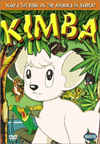Kimba
As a little kid growing up in the late 1970s my afternoons revolved around the TV adventures of "Johnny Sokko and His Flying Robot, " "Ultraman," and "Kimba the White Lion." So why am I blathering on about all of this? Well because, as the evidence above indicates, mine was the first generation to grow up with Japanese popular culture playing a big part in our entertainment lives. So, while I anxiously await the release of a "Johnny Sokko" box set, I’ll have to be content with this latest offering from the funky folks at Rhino — a brand spanking new "Kimba" 4-DVD box set.
Created by Osamu Tezuka — best known for his manga as well as the hit anime film "Metropolis" — "Kimba" first appeared on television in 1965 and was an immediate hit. At the time most American cartoons featured lifeless, uninspired, and just plain sloppy animation. "Kimba" on the other hand was bursting with life and color and featured some genuinely ground-breaking animation work. No wonder our little ears perked up whenever that infectious theme song came on the air. We didn’t fully appreciate it at the time but we certainly did know that "Kimba" delivered the goods and was a blast to watch.
Oddly, the show seemingly came and went and rarely appeared in syndication over the ensuing decades. The only real mention of "Kimba" came about in 1994 when Disney’s "The Lion King" stormed out of the gates on its way to becoming the highest grossing animated film of all time. Anime fans were quick to jump on the Mouse for their obviously derivative story although they — not surprisingly — flatly denied that "The Lion King" was just a rehashed, big-budget "Kimba." But that’s a topic better left to the lawyers.
When Kimba’s father, Panja, is killed by poachers, his mother, Eriza, is taken into captivity and Kimba is born onboard a ship headed for Europe. When the ship begins to sink Eriza’s dying act is to save her young son and he washes ashore in Portugal. After spending some time as a city dweller, Kimba returns to his African homeland. Inspired by the world he has seen and his late father’s legacy, Kimba sets out to create an animal utopia in which all the critters can co-exist in peace.
Pretty simple little storyline really but what hooked us was the splash of color and near constant movement that were so rare in mainstream American animation. Looking back on the show after all these years I find its combination of what would soon become an all too common anime look and obvious 1960s style to be very swank indeed.
Rhino’s new box set contains 26 of the original 52 classic "Kimba" episodes but, as much as I hate to say it, the quality of this release is sub-par and a real affront to the fans who’ve waited so long for this set.
Presented in their original full-frame format, the episodes look flat-out awful on DVD. The picture is so dark and murky that even in the daytime scenes it’s hard to tell what’s going on. Some of the vibrant colors do manage to peek through but I can’t help but feel like I’m watching these discs through polarized lenses. As if that weren’t enough, the picture is also plagued by a whole host of physical defects and blemishes.
Sure, the quick to fade Eastman color film originals are partly to blame but I’ve seen better transfers on VHS and Japanese imports so it’s clear that Rhino could and should have done a better job on these discs.
Audio is presented in an English <$DD,Dolby Digital> 2.0 mix. Here again the problems are quite readily apparent. The opening theme song sounds like it was recorded and mixed in a tin can during a rainstorm and the overall sound quality doesn’t improve much from there.
Once again it would be easy to blame the poor condition of the original materials but even a quick pass by an audio engineer should have been able to smooth out the rough edges a bit.
Am I being a bit hard on Rhino? Yep. But I will at least give them credit for including a few nice bonus features. First up is a 15 minute interview with program production coordinator Fred Ladd. This is an informative piece in which Mr. Ladd discusses Osamu Tezuka’s switch to color animation and the necessity of making the show palatable to both Japanese and American audiences.
Next up is an 11 minute interview with anime historian Fred Patten. This bit gives some background on Mr. Tezuka’s background as both an animator and the grandfather of the modern Japanese manga.
Finally, the original 7-page proposal written up by Mushi Productions for NBC is presented as on-screen text. This is essentially the complete outline for the story and offers some nice background on the tale that the actual television shows either omitted or watered down.
What more is there to say? "Kimba" was an inspiring show to kids of my generation (and a few Disney storywriters to boot ;-)) and it’s nice to see it released stateside on DVD. Unfortunately, the discs themselves are very problematic and border on unwatchable. The depth of your particular anime fanaticism will likely decide whether or not "Kimba" is worthy of purchase. Just another case of great content receiving poor DVD treatment.







